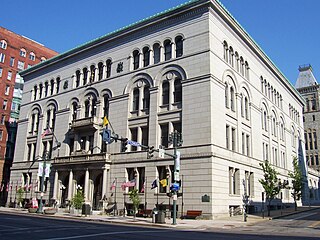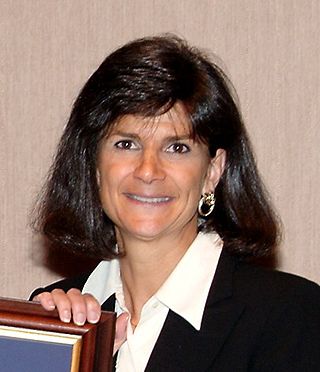Related Research Articles

The University of Rochester is a private research university in Rochester, New York, United States. It was founded in 1850 and moved into its current campus, next to the Genesee River in 1955. With approximately 30,000 full-time employees, the university is the largest private employer in Upstate New York and the 7th largest in all of New York State.

Monroe County is a county in the U.S. state of New York, located along Lake Ontario's southern shore. As of 2022, the population was 752,035, according to Census Bureau estimates. Its county seat and largest city is Rochester. The county is named after James Monroe, the fifth president of the United States. Monroe County is part of the Rochester, NY Metropolitan Statistical Area. The county is part of the Finger Lakes region of the state.

The Eastman Kodak Company, referred to simply as Kodak, is an American public company that produces various products related to its historic basis in film photography. The company is headquartered in Rochester, New York, and is incorporated in New Jersey. It is best known for photographic film products, which it brought to a mass market for the first time.

George Eastman was an American entrepreneur who founded the Eastman Kodak Company and helped to bring the photographic use of roll film into the mainstream. After a decade of experiments in photography, he patented and sold a roll film camera, making amateur photography accessible to the general public for the first time. Working as the treasurer and later president of Kodak, he oversaw the expansion of the company and the film industry.

Lafayette is the most populous city in and parish seat of Lafayette Parish in the U.S. state of Louisiana, located along the Vermilion River. It is Louisiana's fourth-most populous city with a 2020 census population of 121,374; the consolidated city-parish's population was 241,753 in 2020. The Lafayette metropolitan area was Louisiana's third largest metropolitan statistical area with a population of 478,384 at the 2020 census. The Acadiana region containing Lafayette is the largest population and economic corridor between Houston, Texas and New Orleans.

Rochester is a city in the U.S. state of New York and the county seat of Monroe County. It is the fourth-most populous city and 10th most-populated municipality in New York, with a population of 211,328 at the 2020 census. The city forms the core of the larger Rochester metropolitan area in Western New York, with a population of just over 1 million residents. Throughout its history, Rochester has acquired several nicknames based on local industries; it has been known as "the Flour City" and "the Flower City" for its dual role in flour production and floriculture, and as the "Imaging Capital of the World" for its association with film, optics, and photography.

The administrative divisions of New York are the various units of government that provide local services in the American state of New York. The state is divided into boroughs, counties, cities, towns, and villages. They are municipal corporations, chartered (created) by the New York State Legislature, as under the New York State Constitution the only body that can create governmental units is the state. All of them have their own governments, sometimes with no paid employees, that provide local services. Centers of population that are not incorporated and have no government or local services are designated hamlets. Whether a municipality is defined as a borough, city, town, or village is determined not by population or land area, but rather on the form of government selected by the residents and approved by the New York State Legislature. Each type of local government is granted specific home rule powers by the New York State Constitution. There are still occasional changes as a village becomes a city, or a village dissolves, each of which requires legislative action. New York also has various corporate entities that provide local services and have their own administrative structures (governments), such as school and fire districts. These are not found in all counties.

The Eastman School of Music is the music school of the University of Rochester, a private research university in Rochester, New York, United States. Established in 1921 by celebrated industrialist and philanthropist George Eastman, it was the first professional school of the university.

Most U.S. states and territories have at least two tiers of local government: counties and municipalities. Louisiana uses the term parish and Alaska uses the term borough for what the U.S. Census Bureau terms county equivalents in those states. Civil townships or towns are used as subdivisions of a county in 20 states, mostly in the Northeast and Midwest.
A payment in lieu of taxes, abbreviated as PILT or PILOT, is a payment made to compensate a government for some or all of the property tax revenue lost due to tax exempt ownership or use of real property.
The social economy is formed by a rich diversity of enterprises and organisations, such as cooperatives, mutuals, associations, foundations, social enterprises and paritarian institutions, sharing common values and features:

Patricia F. Russo is an American businessperson. Russo is most widely known for having served as chief executive officer of Lucent Technologies, and its successor, Alcatel-Lucent, a large communications equipment manufacturer. As of 2020, she serves on the board of directors of General Motors, Merck & Co., and Arconic, Inc. She serves as chairwoman of the nonprofit organization, Partnership at Drugfree.org. Prior to the split of Hewlett-Packard into two companies in 2015, Russo served as lead independent director. She now serves as chairwoman of Hewlett Packard Enterprise.

New York, also called New York State, is a state in the Northeastern United States. One of the Mid-Atlantic states, it borders the Atlantic Ocean, New England, Canada, and the Great Lakes. With almost 19.6 million residents, it is the fourth-most populous state in the United States and eighth-most densely populated as of 2023. New York is the 27th-largest U.S. state by area, with a total area of 54,556 square miles (141,300 km2).

The Rochester metropolitan area, denoted the Rochester, NY Metropolitan Statistical Area by the United States Census Bureau, is a metropolitan statistical area consisting of six counties in Western New York, anchored by the city of Rochester, New York. Many counties are mainly rural with various farming communities scattered throughout the metropolitan area. As of the 2020 census, the MSA had a population of 1,090,135. The Rochester MSA is the 3rd largest MSA in New York state.
Local government in New Jersey is composed of counties and municipalities. Local jurisdictions in New Jersey differ from those in some other states because every square foot of the state is part of exactly one municipality; each of the 564 municipalities is in exactly one county; and each of the 21 counties has more than one municipality. New Jersey has no independent cities, nor consolidated city-counties.
The Office of Social Innovation and Civic Participation was an office new to the Obama Administration, created within the White House, to catalyze new and innovative ways of encouraging government to do business differently. Its first director was the economist Sonal Shah. The final director was David Wilkinson.

ESL Federal Credit Union is a full-service financial institution with headquarters in Rochester, New York. The locally owned financial institution employs more than 870 people in Rochester, New York, and includes more than 376,000 members and 11,800 businesses. The company has now appeared on the Great Place to Work Best Small and Medium Workplaces for 10 years. Access to the credit union includes 22 branch locations and more than 40 ATM locations, locally based telephone and internet chat centers, and online and mobile banking channels. Membership in ESL is open to employees of Eastman Kodak, members of the George Eastman House, and residents of Rochester, among others.
Timothy C. Wentworth is an American businessman and CEO of pharmacy operator Walgreens Boots Alliance. He is a former CEO of Evernorth, Cigna's health services platform and a former CEO of Express Scripts, the United States' largest pharmacy benefit manager.

Edgerton is a neighborhood in the Northwest Quadrant of Rochester, New York that sits between the Genesee River on the east and the Erie Canal bed on the west. One of the city's oldest and largest residential areas, Edgerton is among the most ethnically, linguistically, and racially diverse communities in Western New York. The neighborhood has been called "the Bermuda Triangle of Rochester" because of its "nearly invisible" status in local politics. Edgerton is currently the poorest neighborhood in Rochester, with an Unemployment Rate higher than that of the United States during the Great Depression.
References
- ↑ Brayer, Elizabeth (January 1990). "George Eastman" (PDF). Rochester History. 52 (1): 8.
- ↑ "Center for Governmental Research names new leader" . Retrieved June 18, 2019.
- ↑ "CGR makes leadership changes". Archived from the original on 30 March 2014. Retrieved 30 March 2014.